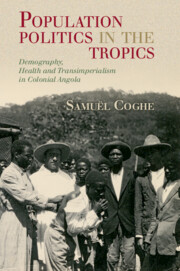Book contents
- Population Politics in the Tropics
- Global Health Histories
- Population Politics in the Tropics
- Copyright page
- Dedication
- Contents
- Maps
- Figures
- Tables
- Acknowledgements
- Note on the Spelling of Proper Names
- Introduction
- 1 Sleeping Sickness, Depopulation Anxieties and the Emergence of Population Politics
- 2 Tropical Medicine and Sleeping Sickness Control Before 1918
- 3 Introducing Social Medicine: Inter-Imperial Learning and the Assistência Médica aos Indígenas in the Interwar Period
- 4 Re-assessing Population Decline: Medical Demography and the Tensions of Statistical Knowledge
- 5 Saving the Children: Infant Mortality and the Politics of Motherhood
- 6 The Problem of Migration: Depopulation Anxieties, Border Politics and the Tensions of Empire
- Conclusion
- Epilogue: Demography and Population Politics, 1945–75
- Bibliography
- Index
2 - Tropical Medicine and Sleeping Sickness Control Before 1918
Published online by Cambridge University Press: 20 January 2022
- Population Politics in the Tropics
- Global Health Histories
- Population Politics in the Tropics
- Copyright page
- Dedication
- Contents
- Maps
- Figures
- Tables
- Acknowledgements
- Note on the Spelling of Proper Names
- Introduction
- 1 Sleeping Sickness, Depopulation Anxieties and the Emergence of Population Politics
- 2 Tropical Medicine and Sleeping Sickness Control Before 1918
- 3 Introducing Social Medicine: Inter-Imperial Learning and the Assistência Médica aos Indígenas in the Interwar Period
- 4 Re-assessing Population Decline: Medical Demography and the Tensions of Statistical Knowledge
- 5 Saving the Children: Infant Mortality and the Politics of Motherhood
- 6 The Problem of Migration: Depopulation Anxieties, Border Politics and the Tensions of Empire
- Conclusion
- Epilogue: Demography and Population Politics, 1945–75
- Bibliography
- Index
Summary
In the early twentieth century, the fight against sleeping sickness became the most important medical intervention and a crucial aspect of Portuguese population politics in Angola. Despite the vast and still growing historiography on this disease, however, the long history of sleeping sickness in Angola, and the Portuguese colonies in general, has received very little scholarly attention. While there are a few articles by scholars based in Portugal,1 international studies, even those with comparative and transimperial approaches, have virtually ignored it, thus implying that nothing noteworthy happened.2 This neglect is all the more surprising given that Portuguese colonial entanglements with the disease already started in the 1870s, varied in some important respects from the story commonly told and left a considerable paper trail in Portuguese, French and English. Together with Chapter 1, which focused on the disease’s early history, demographic impact and broader context, and Chapter 3, which deals with the 1920s and 1930s, this chapter fills this historiographical lacuna. It analyses the multi-faceted medical and administrative efforts to check sleeping sickness in Angola until the end of the First World War. It sheds light on the varied practices, multiple conflicts and intra- and transimperial flows of knowledge that were part and parcel of anti-sleeping sickness policies in early twentieth-century Angola and shows why this ‘Portuguese story’ matters for international historiography.
- Type
- Chapter
- Information
- Population Politics in the TropicsDemography, Health and Transimperialism in Colonial Angola, pp. 65 - 108Publisher: Cambridge University PressPrint publication year: 2022

